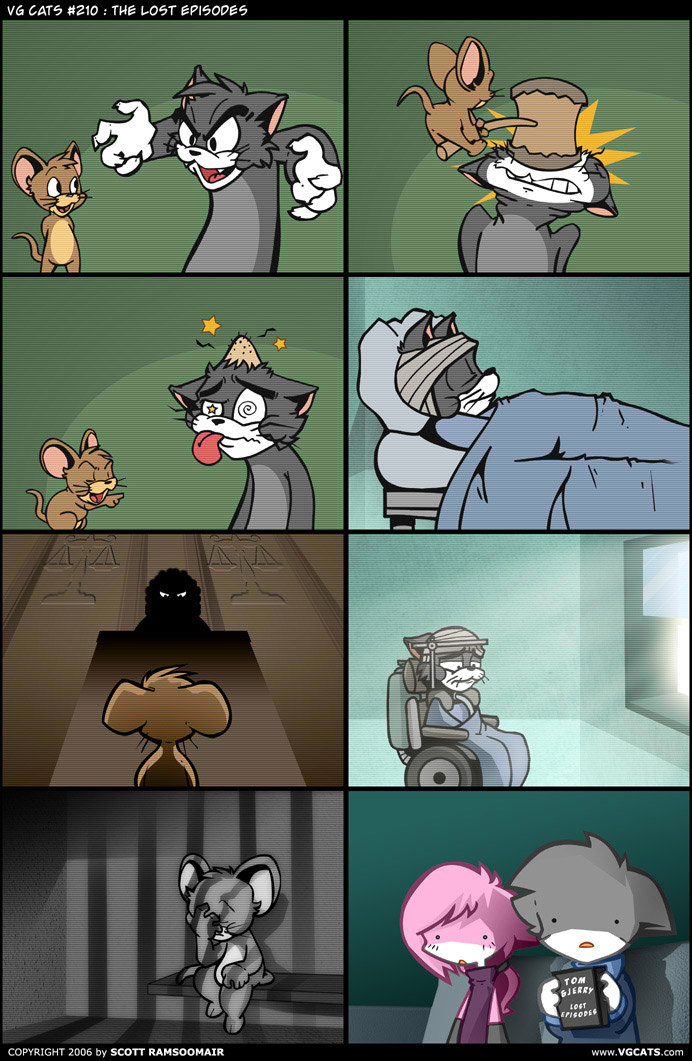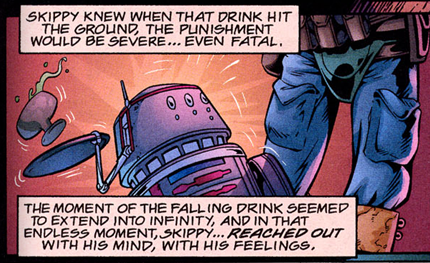If you haven’t heard of Skippy the Jedi Droid, you’re probably not alone; the concept appeared in a one-off story in 1999’s Star Wars Tales #1 and was written by Peter David. The narrative centers around a Force-sensitive droid named Skippy, and yes, (spoiler alert) it’s the very same R5-unit with the bad motivator that appeared in the original 1977 Star Wars film. Using its powers to Jedi-mind-trick Uncle Owen into buying it from the Jawas, it has a vision of the horrors likely to take place if it and not R2-D2 and C-3PO is purchased, so it blows out its own motivator and uses the last of its fading consciousness to mind-trick 3PO into suggesting R2 as a replacement, thus saving the galaxy.
This makes Skippy quite clearly a Gary Stu, the “male” (if programmed gender identification may be applied to sexless droid constructs) equivalent of a Mary Sue.
Defenders of the Disney Star Wars movies, Paul Feig’s abominable Ghostbusters adaptation, and CBS’ STD like to resort to the straw man tactic of crying sexism whenever the term ‘Mary Sue’ is used to accurately describe the shallow, one-dimensional concepts their creators try to pass off as well developed characters. The failure in this method of defense, of course, is the existence of aforementioned male equivalent personified in Skippy (as well as The 300’s King Leonidas), but let it not be said that whiny shallow thinkers are willing to grow up long enough to acknowledge the absurdity of their accusations when faced with the cold hard facts.
But this is a problem that is plaguing Hollywood these days: Nobody was willing to be the adult in the room and tell the likes of Steven Moffat, Alex Kurtz-Man, Ruin Johnson, Jar Jar Abrams, Paul Fatigue, and others guilty of inflicting chronic Mary-Sue-ism on unwilling audiences, that they aren’t very good and certainly aren’t half as clever as they obviously think they are. Their twelve-year-old’s writing level is all too often condescending, cynical, contemptuous of the source material, and as a result, insulting to the intelligence of the audience. For all someone like Moffat, for example, claims to be a huge fan of properties such as Sherlock Holmes and Doctor Who, when you take a closer look at his concepts-in-place-of-characters, his version of Holmes is a classic Gary Stu, so perfect in his genius and social imperfections that he doesn’t need to change, learn, or grow.
By contrast, consider that in Arthur Conan Doyle’s A Scandal in Bohemia, Holmes is truly challenged, both on the case he’s working on and in his perceptions of women’s abilities. He’s forced to confront his prejudices about the so-called weaker sex because he has been outsmarted by a woman, and as a result he is compelled to alter his views, to grow and learn as a person. For Victorian era England, this was a refreshingly ballsy move for Doyle and it paid off, in large part because it portrayed Holmes as a deeply flawed character who when challenged grows intellectually and spiritually, even if only somewhat, and that is what any given audience relates to. We cannot relate to or believe in a flawless, unchanging concept because it’s not based in reality. We reject it because we know that nobody is perfect, and therefore we cannot accept it in a narrative because to do so forces us to suspend too much of our disbelief to be able to get involved in the story.
Likewise, with Ma-Rey Sue, we simply cannot believe she can use the Force like a Jedi Master (Mistress?) without having undergone any real training, to defeat someone with ostensibly many years of experience. We reject it because it’s not based in reality, and any good story and character must have some basis in it. Otherwise we cannot get into the story. That’s why, when Ruin Johnson proved just how much of a rank storytelling amateur he is and always has been with his hack job on Disney’s Episode VIII, audiences reacted so harshly. We reject his and Abrams’ baloney for what it is.
And, of course, there are Feigbusters and STD, both of which rely on Mary Sues as the centerpieces of their respective tales.
The common denominator to all these is that they are so unrealistic that they cannot stand on their own. Audience won’t accept them, and on a certain conscious level, their creators know it. But instead of acknowledging their writing flaws and going back to learn how to write proper characters, the preferred tactic is to try to bolster the shallow one-dimensional concepts by tearing down the original source material. After all, they “reason”, if the original is destroyed, audiences will have no choice but to accept our creations. But the opposite effect has instead occurred: we dig our heels in even deeper in our rejection, because instead of responding to mistakes with acknowledgement and corrective action, we are attacked as sexist, racist, homophobic, and so on.
All of this is borne of contempt, and not only for the source material; too many of today’s writers hold their audiences in contempt as well. Steven Moffat even went to the extreme in one episode of Sherlock by going out of his way to ridicule fans for even trying to speculate about how the hero survived a presumably fatal encounter. But Moffat had set up questions to be answered later in the first place, and has no right to blast anyone for daring to try and come up with answers to questions he himself posed. Likewise, Ruin Johnson’s childish digs at Star Wars fans, both in The Last Jedi and on social media, speak to his sheer disdain for any who have the audacity to speculate on even the ham-handed questions Jar Jar Abrams put forth for viewers to answer on their own in The Force Awakens. And this betrays, too, an even deeper pathology: Why even pose questions at all if they’re not meant to be answered, and if you’re just going to mock people for doing what comes naturally when asked a riddle? In the minds of today’s corporate hack writer-directors, answers are irrelevant, and audiences are childish @$$holes for expecting any or trying to come up with their own. Payoff is for losers, nerds, people too dweebish even for nerds higher up in the social pecking order.
Thankfully, there’s a limit as to how much abuse audiences will take before they vent their frustration by refusing to buy the shi**y product being sold. Although media consolidation increases, diminishing the quality of what’s sold, consumers still have the right not to purchase it. And you can’t force someone to buy something no matter how you might try to enforce it under code of law. That’s largely why Obamacare, modeled as it was on Romneycare in Massachusetts, ultimately failed. Instead of restricting prices or coming up with a public alternative, legislators and executive alike tried to force consumers to buy product that is increasingly un-affordably priced and increasingly defective in providing a necessary service. Small wonder it failed. It did so because you can’t respond to diminishing demand for low quality product by saying, “you HAVE to buy it; you have no choice in the matter.”
At some point Hollywood is going to have to grow up and accept the fundamental truth of economics: people buy product only if it’s good, useful, and reasonably priced. If you only ever produce garbage, don’t expect them to plop down money they realize is better spent elsewhere. Cinema, of course, isn’t going away any time soon. But it may be that, tired of chronic Mary/Gary Sue/Stu-ism, audiences will soon force another Renaissance on the industry. This can be done in part by supporting smaller, lower-budget, well written and executed productions. If those make money at the box office, Hollywood will adapt as it did before and produce more of that level of quality, simply in order to compete.
What are your thoughts? Let me know in the comments below. If you’d like to help support this blog and the YouTube channel, please hit the subscribe button and bell icon to receive notifications whenever content is posted. And please consider becoming a Patron. Not only will it help pay the bills, it’ll help pay to improve the quality of the videos and podcasts.




